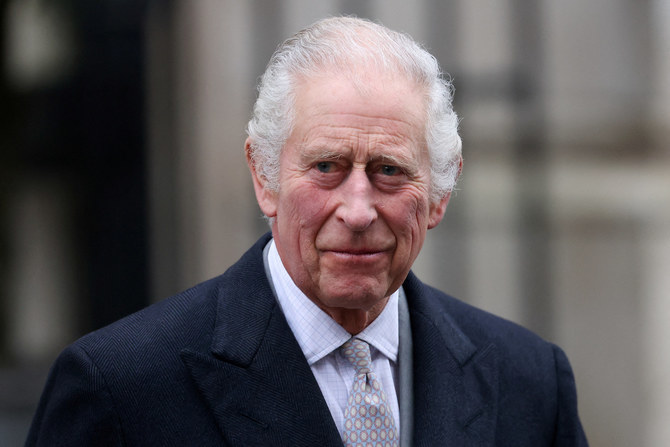LONDON: Britain’s King Charles III has faced criticism for remaining silent on the near-daily riots seen since early last week following a deadly knife attack that killed three children.
While the monarch and his wife Camilla conveyed their condolences to the families of the three girls killed in the mass stabbing on July 29, Buckingham Palace has not commented on the riots which ensued.
“I am surprised that the king as head of state hasn’t come out more forcefully, given that it’s a perilous moment for the United Kingdom,” said historian and royal commentator Ed Owens.
However, according to constitutional law expert Craig Prescott “the monarchy does not comment on current political events.”
“Once the riots have subsided, you might expect members of the royal family to visit places affected and perhaps to see them more in multicultural settings,” Prescott said in a post on X.
“If the king speaks out about this, then what about the next big issue, and the one after that.”
Charles’s silence is in keeping with his mother, the late Queen Elizabeth II, who remained similarly quiet during the last wave of riots which shook England in 2011.
It is typically explained by the expectation that British monarchs avoid commenting on anything deemed political.
Owens argued Charles, who has gradually resumed public duties after a cancer diagnosis earlier this year, may not have publicly reacted due to two main reasons.
On the one hand, he may have been “advised by his government that it would be unwise at this stage of intervene directly.”
On the other, the monarch might himself have deemed the issue too “combustible.”
“To court controversy can lead to the alienation of certain sections of the British public,” Owens told AFP.
Officials have blamed the riots, which have seen mosques and immigration-linked sites targeted, on far-right elements and “thugs.”
They are accused of trying to use the stabbing tragedy and growing mainstream right-wing concern over immigration levels to further their extreme cause.
Owens noted the monarch has previously celebrated the benefits of legal migration as well as multiculturalism.
But his current silence is also “characteristic of a deeper silence on this very specific topic of illegal migration,” which remains politically divisive, he added.
Another complicating factor is that many involved in the riots are “people that pretend that they wrap themselves in the (British) flags and call themselves patriots,” Owens said.
“Some of these individuals would be the natural supporters of the (royal) institution.”
However, that could merit the monarch “taking a stand and saying, ‘not in our name, this isn’t the kind of behavior we expect of anybody in this country,’” Owens argued.
Part of the surprise in some quarters at Charles’s silence could stem from the sovereign having been vocal on social issues and topics like climate change over the years.
Since becoming king he is seen as having presented himself as more accessible than his predecessors, including by opening up about his health.
As heir, he visited areas affected by riots in north London in 2011.
Meanwhile, Charles reportedly expressed private concerns in June 2022 over the then-government’s plan to send failed asylum seekers to Rwanda, calling the proposals “appalling.”
But for Graham Smith, head of Republic, a pressure group which campaigns for an elected UK head of state to replace the monarch, the lack of a response to the riots “goes further than Charles.”
“It is about the institution being a failure because it provides for someone who isn’t able to speak really,” he told AFP.
Charles, who is currently on the monarch’s annual summer holiday in Scotland, has like his mother in 2011 requested daily updates about the situation, according to royal sources reported by British media.
“The fact that that has been made public is important, because what the monarchy is trying to show is that he’s not an uninterested party, that he is taking an active interest in this,” Owens said.
However, Smith is unimpressed by that argument.
“We’re told that the monarchy unites the country, and I don’t think that’s the case. They can’t even speak up when the country is facing far-right riots,” he said.
“There’s no value in a billionaire sitting in his holiday home being updated about what’s happening. I mean, it’s easy to be updated — switch the TV on.”
Britain’s King Charles III has faced criticism for remaining silent on the near-daily riots seen since early last week following a deadly knife attack that killed three children. (Reuters/File)
























